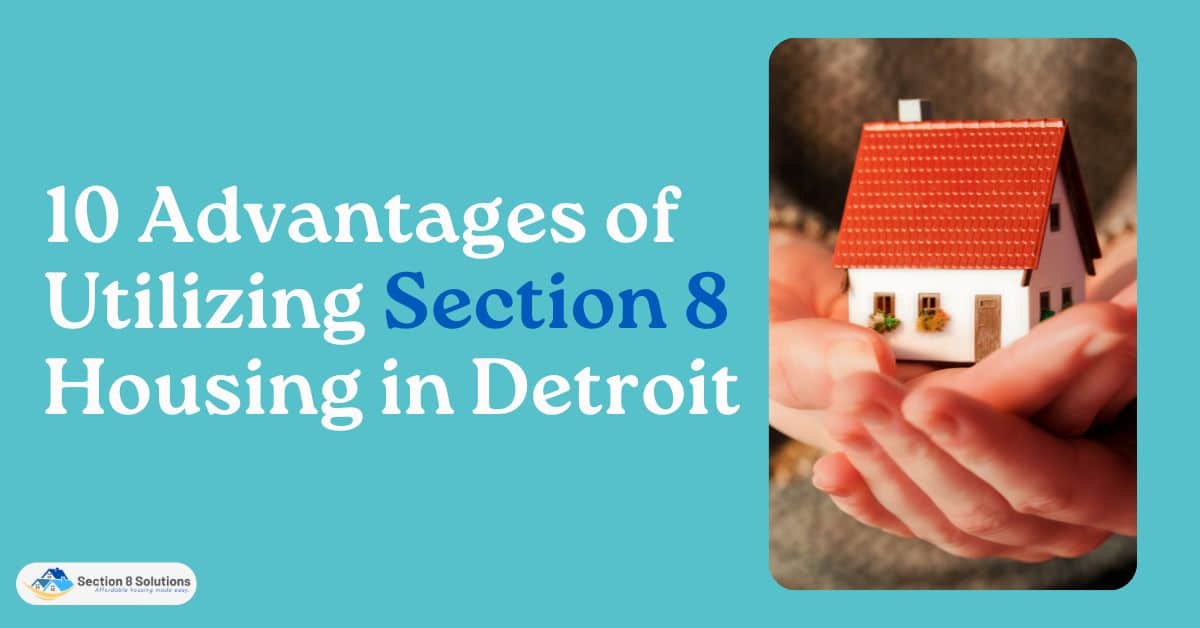Utilizing Section 8 Housing in Detroit offers numerous advantages. Firstly, it provides affordable housing solutions, alleviating financial strain for low-income residents. Secondly, it fosters diverse communities by promoting integration and reducing segregation. Lastly, it boosts local economies as the program injects federal funds, stimulating growth and enhancing the overall quality of life.
In this insightful blog, we’ll investigate the ten significant benefits of embracing Section 8 Housing in Detroit. Ranging from accessible housing choices to the promotion of diverse communities and the stimulation of local economies, we’ll dive deep into the intricacies that render this program a pivotal aspect of Detroit’s housing fabric.

1. Affordable Housing
Section 8 Housing in Detroit stands as a crucial pillar in providing affordable housing solutions for the city’s low-income individuals and families. It accomplishes this by subsidizing rent payments, which, in turn, ensures that residents can access safe, stable, and well-maintained housing units that would otherwise be financially out of reach. The impact of this affordability is far-reaching, going beyond mere cost savings. It lifts a substantial financial burden from many Detroiters’ shoulders, allowing them to allocate resources to other pressing needs, such as healthcare, education, and daily essentials. Affordable housing is not just about shelter; it’s a key element in fostering financial stability, reducing stress, and improving overall well-being.
2. Reduced Homelessness
Section 8 Housing isn’t just about providing roofs over heads; it’s about reducing homelessness in Detroit. By guaranteeing vulnerable populations access to stable housing, the program addresses a fundamental and often heart-wrenching issue faced by many cities, including Detroit. The impact of this effort goes beyond the statistics; it offers individuals and families a chance to regain stability and rebuild their lives. Reduced homelessness has broader implications for the community. It lightens the load on emergency services and shelters, contributes to social cohesion by helping individuals regain their footing, and ultimately strengthens the fabric of the city.

3. Promoting Integration
Section 8 Housing quietly and consistently contributes to the social fabric of Detroit by promoting integration and reducing segregation. The program actively encourages individuals from diverse backgrounds to live in the same neighborhoods. This not only fosters a sense of community but also creates a melting pot where differences are celebrated rather than divided. The impact of this diversity goes well beyond the housing unit’s walls; it strengthens the city’s social fabric, fostering a sense of unity, inclusivity, and shared identity among residents. The neighborhoods become more vibrant and dynamic, and the city benefits from a rich tapestry of cultures and experiences that contribute to its overall resilience and inclusivity.
4. Improved Educational Opportunities
The stability that Section 8 Housing provides has a profound and transformative impact on educational opportunities in Detroit. By offering children a consistent place to call home, the program positively influences school attendance and academic performance. It’s not merely about improving report cards; it’s about providing Detroit’s youth with a brighter path forward. Educational success becomes attainable, opening doors to better futures and breaking the cycle of poverty for many families. Beyond the academic realm, it contributes to a sense of normalcy for children who may have experienced housing instability, providing them with a stable foundation on which they can build their dreams and aspirations.

5. Enhanced Health and Well-being
Quality housing isn’t just about providing shelter; it’s a fundamental determinant of good health. Section 8 Housing plays a pivotal role in enhancing the well-being of its residents. By providing secure and stable living environments, the program reduces stress and offers a foundation for healthier lifestyles. The impact is holistic, contributing to overall physical and mental health improvements. Residents in Section 8 Housing often experience reduced health disparities, leading to healthier and happier lives. This, in turn, reduces the burden on healthcare systems and services, benefiting the entire community.
6. Crime Reduction
Stable housing is the bedrock of safer neighborhoods. Section 8 Housing contributes to this by providing residents with secure homes. This sense of security fosters a sense of ownership, community pride, and collective responsibility among residents. The result? Reduced crime rates. It’s not merely about the data; it’s about creating communities where residents feel safe and empowered. Safer neighborhoods lead to a better quality of life for all residents, and they also make Detroit a more attractive place to live, work, and invest in.

7. Economic Growth
Section 8 Housing isn’t just about providing affordable housing; it’s an economic catalyst. The program doesn’t just subsidize rents; it injects crucial federal funds into Detroit’s economy. This financial infusion has a ripple effect, generating job opportunities, stimulating local businesses, and contributing to overall economic growth. Section 8’s impact goes beyond housing; it’s an investment in Detroit’s economic future. As local businesses thrive and job opportunities expand, the entire city benefits from increased prosperity and vitality.
8. Housing Quality Standards
Section 8 Housing not only offers affordable options but also ensures that residents live in safe, well-maintained homes. The program mandates specific quality standards for properties, ensuring that living conditions meet essential safety and comfort criteria. By upholding these standards, the program raises the overall quality of housing in Detroit. This isn’t just about aesthetics; it’s about promoting healthier and more comfortable living environments for everyone. It contributes to dignity, pride, and a sense of well-being among residents, fostering a community where people can take pride in their homes.

9. Tenant Choice
Empowering tenants with the freedom to choose their housing goes beyond merely providing shelter. Tenant choice promotes autonomy and dignity. It allows individuals and families in Detroit to make housing decisions that best suit their unique needs and circumstances. This choice empowers residents to take control of their lives, fostering a sense of independence and self-determination. Beyond housing, it has a broader impact on personal growth and empowerment, creating more confident and self-reliant individuals and families who are better equipped to contribute positively to their communities.
10. Long-term Housing Stability
Section 8 Housing provides more than just a roof; it offers a pathway to long-term housing stability. For families striving to break the cycle of poverty and build brighter futures, this program provides critical support. By offering stable, affordable housing, Section 8 sets the stage for long-term success. Families can focus on their goals, whether it’s furthering education, securing better employment, or building financial security. It’s not just about immediate housing; it’s about providing Detroit residents with the opportunity to thrive and contribute positively to their communities, breaking down barriers to a brighter future.

Conclusion
Section 8 Housing in Detroit is a multifaceted program that profoundly impacts the city in numerous ways. From ensuring affordability to promoting integration, enhancing education, supporting economic growth, improving overall well-being, reducing crime, and contributing to safer communities, its advantages resonate deeply within the community. Understanding and appreciating these benefits offers a profound insight into the program’s vital role in creating a stronger, more inclusive, and prosperous Detroit.












